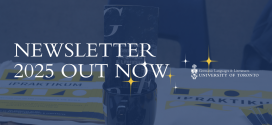You are warmly invited to an academic presentation by Jacob Hermant, PhD candidate in the Department of Germanic Languages and Literatures and the collaborative program with the Anne Tanenbaum Center for Jewish Studies at the University of Toronto.
Lecture Title:
Reading Diasporism in Yiddish Literary History
Date: Thursday, November 27, 2025
Time: 4:00-6:00 PM
Location: Department Library, Room 323, 3rd Floor, Odette Hall
About the Lecture:
Jacob’s dissertation looks at nineteenth-century Yiddish literature and early twentieth-century radical Jewish politics in an attempt to locate and reveal an intellectual lineage between the two movements. The first wave of modern Yiddish literature, as part of the Haskalah (Jewish Enlightenment), is often read as didactic and moralistic, aiming to educate and modernize the Jewish population of Eastern Europe in order to integrate into modern European life and culture, and away from perceived superstition and backwardness, especially with regard to the use of Yiddish as a vernacular. While this was certainly the goal of many authors, a close reading of the period’s Yiddish literary texts can highlight momentary breaks that reveal a far more complicated and nuanced relationship between the Jewish intelligentsia and folk, one which finds both utility and positive affective connections in traditional Jewish life, as well as anticipating threads of diaspora-centric Jewish politics that begin to emerge in the fin-de-siècle.
In this talk, Jacob will outline the structure of the dissertation and then focus on one specific text: “The Travels of Benjamin III,” by Sholem Yankev Abramovitch, often considered the grandfather of modern Yiddish literature. This novella, a parodic travelogue, is often read as purely satirical, ridiculing Jewish life in the shtetlekh of the Russian Pale of Settlement and making fun of the protagonists, Benjamin and Senderl, who attempt to embark on a great journey beyond their town. Another reading, however, finds a second layer to the text, one which finds integrity and productivity in the Jewish world, seeing within it the potential roots for a modern Jewish politics of autonomy in diaspora. In the tension between these two levels of the text, a synthesis of Haskalah and Jewish diasporism begins to take form, linking political and intellectual movements that are, otherwise, viewed as antithetical to one another.
About the Speaker:
Jacob Hermant is a fourth-year doctoral candidate at the University of Toronto in the Department of Germanic Languages and Literatures, and the collaborative program in Jewish Studies. Jacob’s research focuses on Yiddish literature in the nineteenth-century and radical Jewish politics in the early twentieth-century, with a focus on Yiddishism and diasporism.
We look forward to welcoming you to this engaging academic talk!
 Department of Germanic Languages & Literatures University of Toronto
Department of Germanic Languages & Literatures University of Toronto



